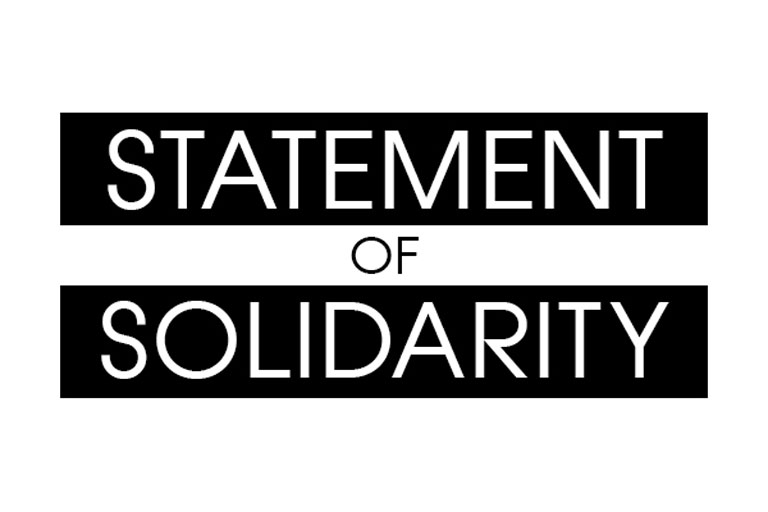Following the killing of George Floyd in May 2020, statements of solidarity with Black Lives Matter and the Black community abounded, issued by hundreds of businesses, organizations and institutions, large and small. But how did Black Americans respond to these statements?
Expressions of “organizational allyship” and how they may backfire is the focus of a new research project by Veronica Derricks, Eva Pietri, and India Johnson. Derricks and Pietri are assistant professors of psychology at IUPUI; Johnson is an assistant professor of psychology at Butler University.
“Many organizations aim to disseminate statements that signal allyship with Black Americans, but there is limited understanding of what may cause these efforts to backfire,” Derricks said. “Investigating this is particularly important given that these statements are often designed specifically to engage members of marginalized groups. Understanding what prompts disengagement from organizations has important implications for racial and ethnic parity and more equitable outcomes for all.”
This is just one of the projects funded by IU’s new Racial Justice Research Fund, established in June 2020 to provide seed funding for projects from across IU that address the systemic conditions fostering racism in our country.
The impact of training on police reforms is the focus of a study by Jill Nicholson-Crotty and Sean Nicholson-Crotty, both professors in the O’Neill School of Public and Environmental Affairs. Using a survey of training academies and programs, the researchers will examine the factors that influence adoption of non-stress training regimes and the impact of those practices on officer behavior in the field, including on use of force.
Fabio Rojas, a professor of sociology in the IU Bloomington College of Arts and Sciences, will analyze large-scale quantitative data from social media, public opinion surveys, and publicly available datasets to develop a comprehensive understanding of how the Black Lives Matter movement has changed American society.
IU’s Racial Justice Research Fund is jointly supported by the Office of the Vice President for Research and the Office of the Vice President for Diversity, Equity and Multicultural Affairs.
"I am extremely pleased to see the breadth and caliber of the research proposals submitted addressing racial inequity and social injustice," said James C. Wimbush, vice president for diversity, equity, and multicultural affairs; dean of The University Graduate School; and Johnson Chair for Diversity and Leadership. "This research will further IU’s work in creating diverse, equitable, and inclusive communities at home and across our nation."
It’s expected that the first round of funding will be followed by an additional round of support in early fall.
"Universities have a collective responsibility to create and apply solutions-oriented research as our state and our nation are seized by another pandemic, one much older and more pernicious than COVID-19—the pandemic of racial discrimination, inequality, and injustice,” said Vice President for Research Fred H. Cate. "The Racial Justice Research Fund is critically needed to understand this pandemic, and I look forward to the ways these projects will equip us all to fight it in every aspect of our lives and our society."
Projects receiving financial support in the first round of funding are:
- Veronica Derricks, School of Science, IUPUI, “Not my organization: Examining how Black Americans’ perceptions of performative allyship affects their sense of identity safety within organizations”
- Tyrone Freeman, Lilly Family School of Philanthropy, “The Giving Syllabus Toolkit Project: Teaching and Study Resources for Decolonizing Philanthropy”
- Virgil Gregory, School of Social Work, “Racial Injustice and Cultural Trauma in African American Men: A Mixed-Methods Study”
- Pamela Jackson, College of Arts & Sciences, “IU Social Empathy Laboratory: Proof of Concept”
- Breanca Merritt, O’Neill School of Public and Environmental Affairs, “Piloting an Assessment Tool for Racially Equitable Policy Design in Government Agencies”
- Jill Nicholson-Crotty, O’Neill School of Public & Environmental Affairs, “Police Training Reforms and Racial Disparities in Policing Outcomes”
- Laurie Paarlberg, Lilly Family School of Philanthropy, “Diversity, Equity, and Inclusion in the Community Philanthropic Response to COVID-19”
- Fabio Rojas, College of Arts & Sciences, “What is the Impact of Black Lives Matter on American Society?”
- Sally Wasmuth, School of Health and Rehabilitation Sciences, “Black Voices for Occupational Justice”




